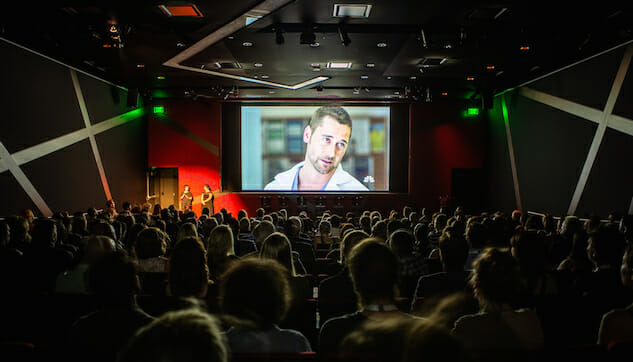At SeriesFest, TV’s “Golden Age” Produces a Gold Rush
Photo: Courtesy of SeriesFest
If a long weekend in the Mile High City can be considered a fair barometer, Denver’s tourism board owes residents a cut of its ad budget: Denverites slip easily into the role of civic booster, extolling its public parks, craft beers, and liberal politics at the first opportunity. And yet, in late June, speaking with locals during the fourth edition (or “season”) of SeriesFest—the still-growing Sundance of episodic storytelling started in 2015 by Randi Kleiner and Kaily Smith Westbrook—I also detect, if not unease, at least uncertainty. At least three bring up, unbidden, Denver’s recent growth, and with it the concomitant growing pains. (The city has added more than 100,000 people in the past seven years, according to census estimates, nearly 20% of the 2010 population.) As in most urban areas in the U.S., the subject on everyone’s lips is housing, though whether one describes it as “development” or “gentrification,” “boom” or “crisis,” likely depends on one’s ability to reap its benefits. In this sense, at least, Denver is the perfect site for SeriesFest, at which it becomes clear that TV’s most recent “Golden Age” has in turn produced a gold rush: The medium, like the Mile High City, is enjoying an unprecedented bull market, but the speed and haphazardness of that growth mean some are in for hard landings when the bubble inevitably bursts.
“It’s true in any gold rush: Not everybody makes it,” says Jeremy Gold, the co-president (with Marci Wiseman) of Blumhouse Television, when we meet one morning on the ground floor of the Halcyon, in Denver’s tony Cherry Creek neighborhood. “And that’s what we’re in. We’re in a gold rush, and not everyone’s going to survive the gold rush. Both buyers and sellers will slip away.” Blumhouse, building on the successful feature film brand behind Get Out, The Gift, and horror franchises from The Purge to Paranormal Activity, has emerged as one of the prospectors: In addition to HBO’s highly anticipated Sharp Objects (a co-production with Entertainment One) and Sacred Lies, an impossible-to-synopsize “handless girl show” (Gold’s words, not mine) that premieres on Facebook Watch on July 27, the company has The Purge TV series, Hulu horror anthology Into the Dark, Showtime’s Roger Ailes limited series, The Loudest Voice in the Room, and three true crime docuseries in the pipeline.
“The big picture question” Gold says, “is ‘How do we break through in this 500-show universe?’”
That question shadows the latest edition of SeriesFest from stem to stern. On the one hand, there are more platforms than ever for the creators of the festival’s strong slate of independent pilots—Mike Roma’s Danny the Manny, about a twentysomething gay man who discovers his six-year-old ward dressing in women’s clothing; Australian supernatural drama Jade of Death, from Erin Good and Taylor Litton-Strain, which follows a woman who can hear when and how people are going to die; and digital short Hug It Out, starring creator Kincaid Walker as a professional snuggler, to name just three whose makers I encounter over the course of the weekend. On the other, pinning down what combination of factors is necessary to make any of SeriesFest’s offerings the next hit TV show—or, for that matter, what constitutes a “hit” in the first place—is near-impossible, not least because the industry itself seems to be frozen in an era of flux. Forget the independent pilots, even the marquee offerings on the schedule are all over the map: In addition to Sacred Lies, there’s AMC’s beachy, blissed-out fraternal order dramedy, Lodge 49; Paramount Network’s modern cowboy epic, Yellowstone, and NBC’s everything-but-the-kitchen-sink medical drama, New Amsterdam.
“An idea has a place,” says Katie O’Connell, CEO of Platform One Media, during a panel on “The Golden Age of Television,” referring to the fact that platforms—the “buyers” Gold mentions—are eager for episodic storytelling with a specific point of view and a strong voice. And yet, she adds, “it’s become a little chaotic,” relating a story about pitching a TV project to 17 outlets, not including the broadcast networks. As in any boom, whether in gold, oil, real estate, or TV, suppliers (production companies) have raced to keep up with demand (from platforms and audiences), and as in any boom this disequilibrium can lead to sharp corrections. We’ve already seen a number of platforms shutter (Seeso, Pivot, go90) or face substantial cutbacks (Crackle) in the face of stiff competition, and as I wrote late last year, this consolidation has also spread to Netflix, Hulu, and Amazon Prime, at least in terms of which scripted originals come to fruition. The “experimental” phase of the Golden Age is slowly being supplanted by the profit-taking logic of the gold rush: by pre-sold properties, from podcasts to comics; by remakes and revivals, from Queer Eye to Roseanne; and by the modern star system. (Meryl Streep singing on to Season Two of Big Little Lies seems to have been the moment of critical mass, if the “Golden Age” panelists are any indication.)